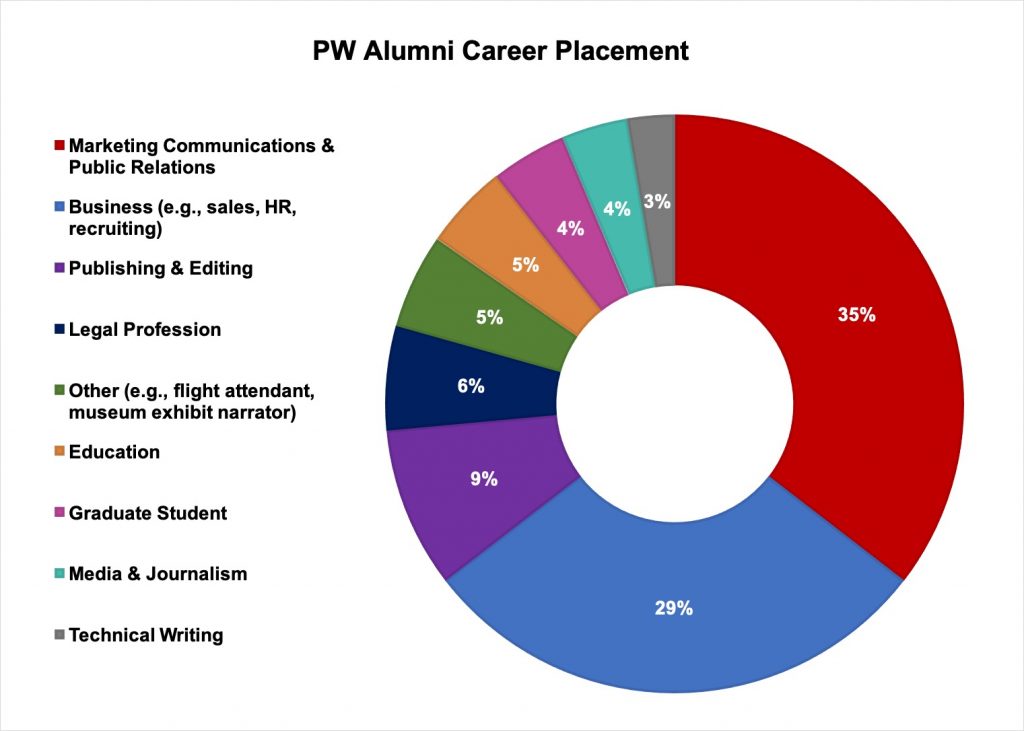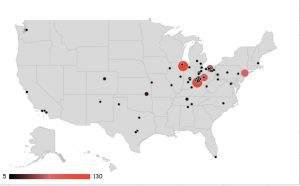Professional Writing prepares majors for many fields and careers. Explore this page to find out what careers Miami PW alumni have chosen and how to leverage the Professional Writing major in the internship and job-search process.
Industries Looking for Professional Writing Majors
The opportunities for PW majors are diverse because in the major students develop knowledge and skills that employers in a wide variety of fields are looking for. Here is just a small sampling of fields that are seeking the expertise that Professional writing majors have:
- Corporate & Organizational Communications: PW provides graduates with experience in a variety of corporate communications, from marketing communications to public rhetorics to multimedia development.
- Legal: Many PW students go on to attend law school or to work as a paralegal. Learning to write well and construct persuasive arguments is an essential skill for the legal field.
- Media and Reporting: The media and journalism industries are always looking for employees with experience writing in different formats and for various audiences.
- Publishing/Editing: With its close focus on writing and with many courses on editing and publishing that count in PW (offered by multiple departments and majors on campus), the Professional Writing major prepares graduates for editing and publishing in print and digital contexts.
- Digital and Technical Writing: Digital and technical writers create communications for digital and technical contexts. They are employed in a wide variety of areas, including serving as project writers collaborating with scientists or engineers to write reports and proposals, writing documentation for software or instructional manuals, and writing user-interfaces for digital programs and apps.
PW Alumni Career Placement
The results of a study of the career placement of 200 Miami University Professional Writing alumni shows that graduates enter a variety of fields. The graph below shows the percentage of alumni who have entered different professions.

Professional Writing Job Growth
The U.S. Department of Labor’s Occupational Outlook Handbook projects that many occupations that PW graduates enter have an expected growth rate of up to 15% over the next decade.

A graph depicting expected growth rates in PW related jobs.
Locations of PW Alumni
PW alumni have launched their careers across the United States. Many have settled in New York, Chicago, Cincinnati, Columbus, and Cleveland. In addition, students are also working abroad, including in Australia and Spain. With a PW major you may pursue a career anywhere you wish to live.

Strategies for the Job and Internship Process for PW Majors
Expressing the skills you gain through your Professional Writing might seem difficult, but leveraging your major starts by creating your story and articulating what you have to offer, recognizing your skills, and focusing on how to present them in a way that relates to your potential job.
As evidenced by the high employment rate of Miami professional writing majors (99.9 percent), Professional Writing majors are highly sought after in a variety of fields including business, communication, marketing, publishing, legal, and others. Because of the flexibility of the diverse field of Professional Writing and because of Miami’s major and how students tailor their studies to their career goals, it is essential that PW majors know how to market themselves and the skills they have in a job interview. Here are some helpful tips below for presenting yourself as a PW major for a variety of positions.
Remember too the many excellent resources available in-person and online at Miami’s Center for Career Exploration and Success.
Figure out your “story.” What do you have to offer?
Create a short (1-2 sentence) description—also known as an elevator pitch—that summarizes you and your narrative. What are you particularly good at? What are your interests and goals? Employers want to get an idea of who you are, so make sure to have a self-summary ready for an interview.
Recognize your skills
Employers care about skills more than anything else. According to the 2018 Job Outlook Survey conducted by the National Association of Colleges and Employers, the top attributes employers look for in a candidate are:
- Problem-solving skills
- Ability to work in a team
- Written communication skills
- Leadership
- Strong work ethic
- Analytical/quantitative skills
- Verbal communication skills
- Initiative
Due to the comprehensive PW course requirements and electives, PW majors gain experience in all of these listed skills by the time of graduation. The best way to recognize your skills is to create a document with a list of the things you learned in various classes taken and in various internships/jobs held, focusing on the skills gained and the types of projects completed. For example: did you create a social media strategy for your PW capstone class? If so, mark that down as experience with teamwork, problem-solving, written and oral communication, initiative, and analytic skills. Reviewing what you’ve learned and done and having at the ready examples to show different skills you have will help you as you customize cover letters or prepare for oral interviews.
Present your skills
Now that you have a complete list of your skills and projects, you’ll need to present them. The professional world is organized by skills, not subjects, so be specific in your cover letter and interview answers. If you tell an employer that you took a copyediting class, their reaction might be, “Okay, but what did you actually learn?” But if you say that you applied your attention to detail and your organizational skills to create and apply a style guide to an ebook publication, they’ll be more impressed. Employers want proof that you have experience and they can rely on you. There’s a big difference between saying you’re good at something in a general way and showing a precise example where you used it. Everything should be framed in a way that shows employers how you can help them and what specific expertise and skills you bring.
Advice from PW Alumni
When it comes to job search advice, alumni can be a great resource. On the main department website, more than 30 alumni share advice in their profiles (see PW Alumni Profiles, and here is just a sampling of that advice.
Take advantage of the need for strong writers
“The skills we learn in PW are not industry-specific. Industries can be learned, but strong communication skills are fundamental in any role. With a clear resume, strong writing samples, and engaging cover letter, you already have a leg up.” – Alicia Auhagen ’16
“Being able to write at a professional level is a skill any and every employer looks for, and written job applications are a great opportunity to showcase these skills.” – Mary Schrott ’17
Refine your communication skills
“Communication is everything in business and life. Better communicators always have leverage when it comes to reaching their goals. If you’re the most skilled applicant for a job, but you can’t communicate that, then you’ll lose the job to the person who can communicate better. A PW major will be trained to use logic, emotion, and credibility to get that job or raise.” – Brian Robben ’15
Provide examples for your skills
“Job interviews are the ultimate test for a PW major—how do you build a successful argument to persuade your audience to hire you? Find the skills you truly excel at then identify examples of when you accomplished something using them. I highlighted my communication skills, my technical writing skills, attention to detail, project management skills, and that I take initiative when there are opportunities to do so.” – Alison Block ’17
“Being that my job is in the PR field, during interviews I was able to speak of my experience working with clients, writing copy and creating content for various mediums—all of which came from studying professional writing.” – Mary Schrott ’17
To read about more alumni advice and experiences, please visit the Professional Writing Alumni Profile page.
